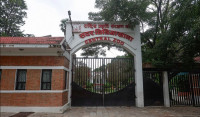Sun, May 25, 2025
Valley
Discrimination major cause of uterus prolapse, says AI report
Reena Pokhrel of Dailekh always dreaded her pregnancies. She was married at 15 and had her first baby at 17.
bookmark
Manish Gautam
Published at : February 21, 2014
Updated at : February 21, 2014 08:32
Kathmandu
Reena Pokhrel of Dailekh always dreaded her pregnancies. She was married at 15 and had her first baby at 17. Four days prior to the birth of her first child, she had high fever that prolonged labour.
Because the delivery was taking place in such a remote location, the help she got was rudimentary: a group of women tied a rope to Pokhrel’s hips and shook her body violently to release the baby. Pokhrel went on to have five more children over ten years, and with every successive delivery, all of them difficult, her uterus sagged more and more. By the time she was done having babies, her uterus had prolapsed horribly.
Many studies have been conducted on uterine prolapse among Nepali women and they outline many causes for the phenomenon. The most recent study, by Amnesty International, entitled Unnecessary Burden: Gender discrimination and Uterine Prolapse in Nepal, was made public on Thursday. The report seeks causes beyond medical reasons for prolapse and zeroes in on societal factors—mainly, gender discrimination.
Pokhrel, for example, should not have had as many babies as she did in such a short span. She also should not have been working hard during pregnancy, should have got a nutritious diet and rested well after delivery. She was not so lucky. She says that she could not eat her fill during those years and she remembers going to the jungle to fetch firewood a mere four days after one delivery.
Pokhrel could be viewed as a victim of the many beliefs about women that are rampant in society. “Uterine prolapse is rooted in discrimination that has severely limited the ability of women and girls to make decisions about their sexual and reproductive lives. Harsh working environments, early marriages and having too many children all contribute to the condition,” the report states.
It is not that the government has not taken steps to tackle the problem. Madhu Malhotra, director of Amnesty International’s Gender, Sexuality and Identity Programme, says the government has focused mostly on providing surgery for late-stage prolapse cases. The government started providing free surgeries to patients five years ago. Government data show 48,096 patients have been treated so far, with a majority operated.
But Malhotra feels prevention should be the focus as much as the cure. She says that to nip the problem in the bud, the government needs to take on discrimination against women head on. She also urges the government to eradicate the stigma associated with uterine prolapse. Pokhrel, for instance, suffered silently for 21 years, ashamed of her condition. Malhotra feels that there are many measures that need to be taken to help women like Pokhrel. “The most important preventive measure would be to recognise the uterine-prolapse problem as a human rights issue,” says Malhotra.
CA rules drafting panel may seek extra time
KATHMANDU: The committee headed by Laxman Lal Karna tasked with preparing the rules of procedure for the Constituent Assembly and parliament is likely to seek an extension of its February 22 deadline.
The CA on February 12 formed a 49-member committee to prepare the rules in 10 days. One of the contentious matters the committee is expected to suggest ways for the CA to take up is taking the ownership of progress made by the last CA. The lack of rules is affecting the constitution drafting process one month since the first meeting of the CA.
“Serious discussion on the issues will begin only tomorrow [Friday] and the deadline expires Saturday,” said a senior member of the committee requesting anonymity. The leader said that the committee will be unable to complete its task on time but did not ascertain the number of extra days to be sought. (PR)
Most Read from Valley
Editor's Picks
E-PAPER | May 25, 2025
×




 25.12°C Kathmandu
25.12°C Kathmandu










